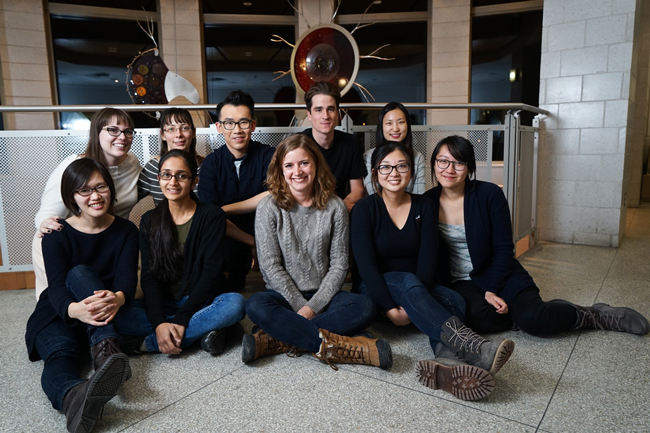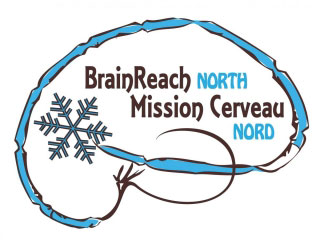
By McGill Reporter Staff
If your ideas about science comes from mainstream culture then you might think scientists are like Leonard and Sheldon on the popular television series, The Big Bang Theory – Cal Tech physics students who, smart as they may be, are hopeless in social situations.
That is clearly not the case for the three graduate students in McGill’s Program in Neuroscience (IPN) who are spearheading BrainReach North, an online outreach initiative to give teachers and students in outlying areas better access to science resources. Suna Jung is doing a PhD in vision development; Ian Beamish is doing an MA on memory formation; and Kelly Smart is doing a PhD on the effect of stimulant drugs on the brain.
 “We want students to see that scientists can be young women and men in jeans,” says Smart, President of BrainReach North. “The biggest challenge with our online programs is to overcome the indifference that many students feel about science, and make it relevant and understandable for them. We also try to establish a personal connection to the teachers and students whenever we can, so that they can see what a scientist actually looks and acts like. We’re hoping to help establish modelling so that when they think of science and scientists they know that we are not all guys with bad hair in lab coats.”
“We want students to see that scientists can be young women and men in jeans,” says Smart, President of BrainReach North. “The biggest challenge with our online programs is to overcome the indifference that many students feel about science, and make it relevant and understandable for them. We also try to establish a personal connection to the teachers and students whenever we can, so that they can see what a scientist actually looks and acts like. We’re hoping to help establish modelling so that when they think of science and scientists they know that we are not all guys with bad hair in lab coats.”
BrainReach North provides teachers in remote aboriginal communities with activities to introduce students to neuroscience. BrainReach North’s mission, as outlined on its website, is to:
- engage youth through interactive activities to help them understand why science is fun and important in our lives.
- connect students in remote areas of Quebec with real-life working scientists in Montreal.
- inspire the next generation of neuroscientists, wherever they may be
The free educational materials are downloadable and digital; easy to implement in classrooms; tailored to fit into the Quebec curriculum; hypothesis driven and relevant to everyday life; and designed to encourage critical thinking through the scientific method.
Smart talks about her recent trip to Kawawachikamach, (known as “Kawa”) near Schefferville, population 586, where residents speak Naskapi, French and English. She says there is no reliable internet access, so teachers and students download and use the BrainReach North materials as needed. The trip was made along with members of Let’s Talk Science McGill, another student-led outreach group that promotes science literacy among youth.
Smart believes neuroscience is perfect for students who are still discovering themselves, and exploring what and who they intend to become. Having enthusiastic young neuroscientists teach students allows them to share their passion. It’s also a valuable opportunity for graduate students to learn about teaching. Student organizers hope to reach as many children as possible and educate them on how their brains function, remove the stigma of mental illness by teaching them the biological basis of mental disorders, and increase understanding of what it is to be a scientist.
BrainReach North is on off shoot of BrainReach, an award-winning, non-profit, community outreach program managed by IPN graduate students. BrainReach provides fun, interactive neuroscience-based workshops to young students at the elementary (Grade 4) and high school (Secondary 3) level in under-resourced neighbourhoods around Montreal. BrainReach has been such a success that organizers decided to extend it online to remote communities in the near and far north.
The basic BrainReach program uses materials aimed at students in grades 2-8. The program is entirely web-based and is intended to be flexible enough to accommodate a variety of classrooms and learning environments. Question-and-answer sessions or correspondence with teachers and students are set up so kids can learn what it means to be a scientist.
For six to eight months, IPN graduate students visit the same classrooms at chosen schools. They lead 45-60 minute interactive workshops, created with “brain based learning” in mind and specially designed to captivate young minds. Each month, they present a different facet of neuroscience that is relevant to the pupils.
The IPN is unique in Canada. It’s an inter-disciplinary, inter-departmental graduate program and Canada’s largest graduate neuroscience program. With more than 300 graduate students and over 240 professors, the IPN spans the full spectrum of neuroscientific fields of research, from cellular and molecular neuroscience to behavioral and cognitive neuroscience.
Learn more about BrainReach North
